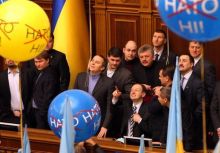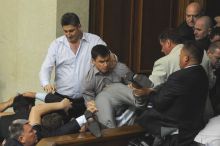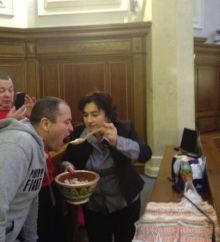The Ukrainian parliament has long been a source of bad news. The Razumkov Center’s latest survey data show that a mere 6.4 percent of those polled supports performance of the Verkhovna Rada, with 35.5 percent approving some of its actions and 52.6 percent totally disapproving. Ukraine’s MPs are so much used to breaking the law, for example, voting for somebody else or blocking the podium, that they consider it “normal.” Ordinary Ukrainians are also used to this situation – most of them tend to reelect parliament members, even though they mistrust them.
The opposition is still blocking parliament. Their reasoning is quite clear, and the public mostly accepts it. The oppositionists are calling for such a constitutional norm as in-person voting, which is an absolutely right demand. Yet they still fail to come to terms with the government on this. Fruitless talks have been going on for 10 days, while the session was to have opened on February 5. Everybody is standing their ground. The opposition suggests putting the Rada 3 system into operation and, if it proves technically obsolete, opening the session and temporarily voting with hands or ballots. The government insists that first the session should be opened and this problem will be solved gradually later on. To tell the truth, both the government and the opposition are wrong because they are breaking the law.
After speaking to our experts, we can come to a number of conclusions. What are the “sins” of the parliamentary majority? Its MPs always violate a constitutional principle – they do not vote individually, so the decisions they make can be called into question. It is an old practice typical of previous-convocation parliaments. For this reason, many of the current oppositionists can also be dubbed former “button-crushers” (those who push somebody else’s button). Of course, this cannot justify the government which has got used to “piano-style voting” and, what is more, is not exactly willing to tackle problems. For if the “touch key” is to be put into action, the Party of Regions will either lose majority in the Verkhovna Rada or have to establish strict discipline in its faction. Incidentally, many “Regionnaires” favor the latter (see an interview with Yurii Samoilenko, Den, No.13, February 13, 2013). In a word, it is a problem.
But still more problems arise in the opposition camp. Firstly, it is difficult to answer the logical question why, after the opposition demanded later last January convening an extraordinary session of parliament to discus the Tymoshenko situation, the government did not agree, or in fact refused, to address urgent problems at the regular session on February 5. Has the problem been really solved?
Secondly, those who are breaking the law today are not only the parliament majority “pianists” but also the ones who are obstructing parliament. The latter are even in a greater danger. Why? After the Verkhovna Rada regulations were granted the status of law in 2010 and this law was amended in November 2012, blocking the podium is now a breach of law that prevents an MP from doing his or her duties. The Criminal Code envisions criminal liability for this. While breaking the constitutional provision on in-person voting is a breach of law, there are no mechanisms for bringing one to criminal justice. This means that in the current situation any MP can complain to the Prosecutor General’s Office that his or her work is being hindered. Then prosecutors can instigate proceedings against the oppositionist who is blocking the parliamentary podium and bring him or her to criminal justice.
Thirdly, the abovementioned circumstance is further aggravated by the fact that the blame for failure to open a session will lie with the opposition. Under the Constitution, the regular session was to open on the first Tuesday of February, but the opposition never allowed this to be done. Now, even if parliament is de-blocked and goes into session, the latter will be illegitimate because it failed to start in good time. Accordingly, all its resolutions can be considered illegitimate. To get the answer to the question of what to do in this situation, one should go to the Constitutional Court. The latter can find a legitimate way for the Verkhovna Rada to resume its work.
All this shows that the opposition made a serious mistake by failing to take into account all the nuances before launching “Operation Blockade.” As they finally opted for this step, they might have at least let the session begin its work and, incidentally, tackle the questions they wanted to be discussed at the extraordinary session. Only then could they have blocked the podium and demanded in-person voting. It would have had more justifications in this case. As a result, the government is now in a very favorable situation. Now it can put all the blame on the opposition, bring the obstructers to criminal justice (the majority will have enough votes to deprive them of parliamentary immunity), and turn the illegitimate parliament to their own account – for example, to impose direct presidential rule, etc.
Finally, as is known, it is the UDAR party that hit up on and implemented the idea of obstructing parliament. It is not Fatherland or, moreover, Freedom, whose radical actions the voter has got used to, but UDAR whose leader said recently that using force was not their method. This raises the question: who set up Vitali Klitschko and his party? Who dealt a blow to UDAR (“udar” means “blow, strike” in Ukrainian)? Why are there no members of Fatherland and Freedom among the obstructers, although they are saying in all radio and TV programs that they will fight to the bitter end, as far as in-person voting is concerned? Due to their lack of experience in political and, moreover, parliamentary intrigues, UDAR members may have to take all the flak and be the object of criminal cases, which may also tarnish the image of other political forces. Incidentally, this is to the benefit of both the government and the rest of the opposition. Yes, obstruction may be bringing in dividends and boosting the rating today, but the current tactic may prove disadvantageous in the long run.
Therefore, it is better for the UDAR party to ponder over the way to ride out this situation in order not to expose itself to further danger and avoid another scandal that will sully the image of Ukraine. Incidentally, as for the reputation of a country’s top legislative body, members of the Ukrainian parliament, especially the “Regionnaires” who have repeatedly resorted to strong-arm tactics in the struggle against their opponents, keep on saying that there are also brawls in the parliaments of developed democratic countries. But, for some reason, these MPs forget to remember the traditions of parliamentarianism in democratic countries. They do not argue over constitutional norms and laws – they observe them.
“There are fist-fights in [the parliaments of] Turkey, Japan, India,” international law expert Volodymyr Vasylenko says. “It is a surge of emotions about an acute problem. But they do not violate principles of parliamentarianism. But in this country, especially when the Party of Regions came to power, the principles of parliamentarianism began to be betrayed. Procedure rules are grossly violated whenever the Verkhovna Rada passes a legislative act. By contrast, parliamentarianism all over the world means observation of the procedure that calls for a compromise between different sectors or strata of the population. The Party of Regions uses force to impose the laws adoptable without a consensus.”
The UK parliament is a cradle of the traditions of parliamentarianism. “The British Parliament is one of the oldest in the world,” Vasylenko continues. “It has already laid down certain rules and procedures which they unconditionally adhere to. It never happens that somebody may disregard and ignore an opposition party when a law is being passed. They do everything on the basis of a compromise, painstaking and detailed discussions in committees. Only then are these decisions submitted to a plenary session. There are special voting days in Britain – everybody knows this and comes to vote. There is no such thing as using somebody else’s card. Even if voting is held on a non-scheduled day, parliament clerks phone the MPs, and they will all show up. Moreover, special ramps have been installed in the houses of parliament for wheelchair-bound MPs to be able to go to the session room and vote in person.”
Ukrainehas its traditions of parliamentarianism, too. They are quite meaningful, albeit modest. What did the first parliament (1990-94) differ from the current one? “There were nationalists, social democrats, and communists in the first Verkhovna Rada,” says Levko Lukianenko. “We all lived off our salary. This means there were no big personal interests – we were all the same. We differed ideologically: nationalists against communists and communists against nationalists. As the then communists were not interested in property, they were more honest in political disputes. But the objective truth was on our side, so they accepted our argumentation. Whenever you showed them black, they said it was black no matter what the next question was and what a frank answer might lead to.”
In Lukianenko’s words, this made it possible to conduct a debate and persuade the communists. “We used to strangle them with facts,” the former MP continues. “We had gained rich knowledge in prison because we did Ukrainian studies. We knew what our people had not yet known. We would tell the communists all this and they would agree. We argued with them from the rostrum, in the vestibule, in the buffet, in the restroom, and, after work, in the hotel – we sometimes stayed awake until midnight. The first-convocation Verkhovna Rada began to work on May 15, 1990, and we managed to reeducate the communists within two months to such a degree that over 300 MPs voted for the Declaration on the National Sovereignty of Ukraine. Then came the abortive coup d’etat, and as many as 346 people’s deputies voted for independence on August 24, 1991.”
What came next? “When independence was being declared, the nation achieved its goal and it was time to think how to reform this country,” Lukianenko says. “Then there was privatization. Parliament gradually began to bow to an arithmetic majority and material interests. ‘Red factory managers’ were thinking how to grab or divide public property. They only laughed at our attempts to address the problems of culture, language, traditions, informational space, public reeducation, etc. Money was above all for them now. So we gradually saw a more cynical, down-to-earth, egoistic, and gangster-style parliament.”
This negative tendency must be reversed. Ukraine had been deprived of its own parliament for a very long time and should not allow one of the basic instruments of democracy to be used so light-mindedly in private interests. The Verkhovna Rada is a national value which we must clean up, develop and improve.









